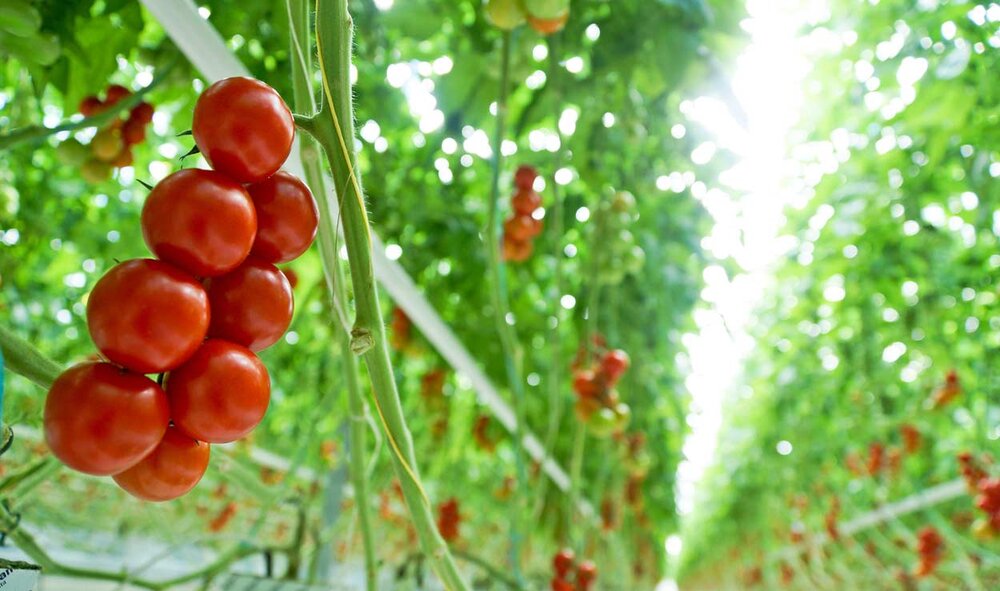Cultivation started in 5.5 hectares of greenhouses in Gorgan last year

TEHRAN- Cultivation was started in 5.5 hectares of new greenhouses in Gorgan County, the capital of Golestan province in the northeast of Iran, in the past Iranian calendar year (ended on March 20), the director of Agriculture Department of Gorgan announced.
Ebrahim Molla-Ali said that new greenhouses in over 28 hectares of land have been ready to start cultivation since the previous year, so 22.5 hectares will be added this year.
Given the potentials of the province, implementation of the greenhouse development plan in all parts of Golestan specially in Gorgan County is on the agenda, the official further noted.
Stating that job creation is one of the most important goals of supporting the mentioned plan, he said: "Last year's facilities have led to the direct and indirect employment of 75 persons, and this process of supporting job creation continues."
In recent years, the water crisis has caused serious challenges in Iran’s agriculture sector.
To solve this problem, several solutions, including the implementation of pressurized irrigation project and greenhouse cultivation, have been emphasized by experts and officials in this sector.
Iranian Agriculture Ministry’s Greenhouse Development Program is one of the priority projects of this ministry which aims at increasing productivity, efficiency, and water consumption management in the agriculture sector.
The program was approved in the Iranian calendar year 1395 (ended on March 20, 2017) under the framework of the National Resilient Economy Plan.
The development of the country’s agricultural parks and greenhouses not only is going to create new job opportunities but also increases the country’s non-oil exports and helps preserve the environment and the national water and soil resources.
In last August, Darioush Salempour, the director of the Agriculture Ministry’s Greenhouse Development Program, had mentioned the ministry’s plans for the modernization and renovation of the country’s traditional and old greenhouses, saying: “Our plan in the 10-year horizon is to improve and renovate more than 5,000 traditional, wooden and worn-out greenhouses across the country.”
“We have planned to renovate about 650 to 700 hectares of traditional and worn-out greenhouses each year,” he added.
Due to the growing need of the market for flowers and ornamental plants, as well as off-season vegetables and summer crops, greenhouse cultivation has become one of the most profitable agricultural sectors today.
Cultivation in the controlled space of the greenhouse will have an average of 10 times higher yield per unit area than outdoor cultivation due to suitable environmental conditions.
Significant reduction in water consumption in modern greenhouses is in fact the major advantage of greenhouse cultivation.
In greenhouse cultivation, due to the closed environment, water loss through various evaporation ways is greatly reduced. Also, through mechanized irrigation methods such as irrigation canvas and irrigation tape, water consumption is minimized.
Increased control over pests, weeds and diseases is the other advantage of greenhouse cultivation.
In greenhouse cultivation, due to accurate monitoring and control of pests and diseases, especially the use of biological control methods and a sharp reduction in the use of chemical pesticides, we will see an increase in product quality, that will lead to the popularity of the product in the market and increase export capability.
As a result, along with preserving the soil and environment, we will see good foreign currency income.
As announced by the director of the Agriculture Ministry’s Greenhouse Development Program, 3,200 hectares of greenhouses is targeted to be established in the country in the current Iranian calendar year (started on March 21).
Salempour said that according to the plans and coordination made with the agriculture departments of the provinces, 3,200 hectares of greenhouses will be created in the country, and 686 hectares will be improved and renovated this year.
Greenhouse development in each of the provinces will be done based on climatic conditions and capacities, infrastructure for access to facilities, manpower status, proximity to the target consumer market and export markets, population, development history and investment in this field, he further explained.
This year, based on the plans and also the mentioned factors, provinces such as Sistan-Baluchestan, Fars, Kerman (south of the province), Tehran, East Azarbaijan, Ardebil, Bushehr, Khorasan Razavi, Hormozgan, Yazd and Isfahan will be given priority in the development of greenhouses, the official added.
The director of the Agriculture Ministry’s Greenhouse Development Program further underlined that despite economic conditions caused by the coronavirus pandemic, sanctions against the country, and limited credit facilities, 1,510 hectares of new greenhouses, equivalent to 50 percent of the development goal, was established, and 597 hectares of greenhouses, equivalent to 86 percent of the notified plan, was renovated in the past year.
“We try to achieve the maximum goals set in the greenhouse sector this year by coordinating with the provinces, allocating timely and cheap facilities and providing incentives”, the official added.
He also named elimination of production barriers, expansion of government and legal protections, facilitation of licensing conditions, payment of bank facilities, shortening of investment process, empowerment of implementers and experts by holding training courses, and holding specialized exhibitions as some of the programs of the ministry’s Horticulture Affairs Department for greenhouse development.
MA/MA
